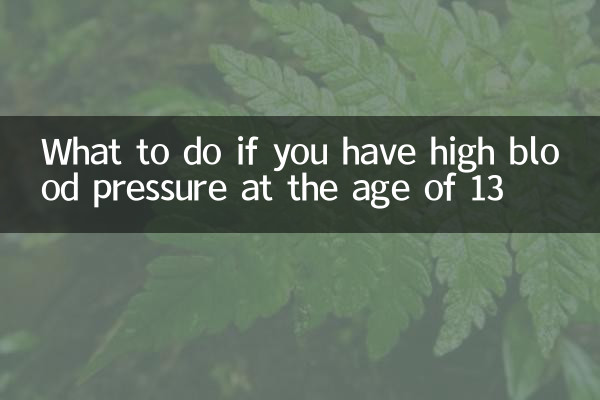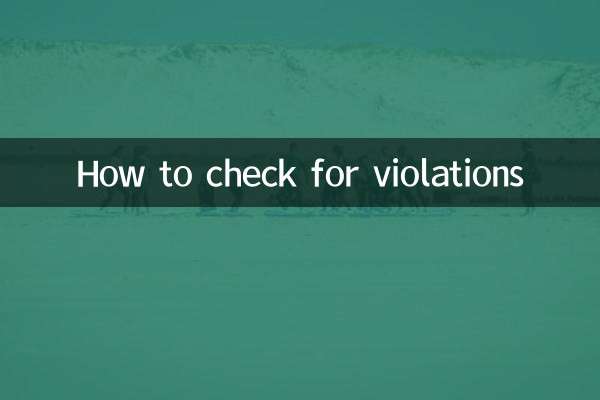What should I do if my blood pressure is high at the age of 13? ——A must-see scientific response guide for parents
In recent years, the problem of hypertension among adolescents has gradually attracted social attention. According to the latest data, the prevalence of hypertension among adolescents in my country is on an upward trend, and it is not uncommon for children around 13 to experience abnormal blood pressure. The following is a comprehensive analysis and solution to this problem.
1. The normal blood pressure range of 13-year-old adolescents

| Age group | Systolic pressure (mmHg) | Diastolic blood pressure (mmHg) |
|---|---|---|
| 13-year-old male | 90-120 | 60-80 |
| 13-year-old female | 85-115 | 55-75 |
| Hypertension standard | ≥130 | ≥80 |
2. The topics related to teenage hypertension that have been hotly discussed on the Internet recently
| Topic Category | Popularity index | Main discussion points |
|---|---|---|
| Academic stress and hypertension | 8.7/10 | Too heavy school burden leads to insufficient sleep |
| Impact of use of electronic equipment | 7.9/10 | Too long screen time leads to insufficient exercise |
| Adolescent obesity problems | 9.2/10 | Bad eating habits are the main cause |
| Family genetic factors | 6.5/10 | Genetic risks of parental hypertension |
3. The main reasons for increased blood pressure in 13-year-old children
1.Lifestyle factors: Lack of exercise, high-salt and high-sugar diet, lack of sleep, excessive use of electronic devices
2.Psychological stress factors: Academic stress, family tension, social anxiety
3.Physiological factors: Obesity, pubertal changes, genetic predisposition
4.Secondary factors: Kidney disease, endocrine problems, etc. (Medical examinations are required)
4. Countermeasures for high blood pressure at the age of 13
1.Medical examination: First, you should take your child to the pediatrics or cardiovascular department of a regular hospital to rule out the possibility of secondary hypertension
2.Lifestyle adjustment:
| Adjust the project | Specific measures | Expected results |
|---|---|---|
| Dietary adjustment | Reduce processed foods and control salt intake (<5g/day) | Effective in 2-4 weeks |
| Exercise plan | 30-60 minutes of moderate-intensity exercise every day | Effective in 4-8 weeks |
| Sleep management | Ensure high-quality sleep for 8-10 hours | Effective in 1-2 weeks |
| Screen time | Control within 2 hours/day | Long-term improvement |
3.Psychological intervention: Relieve stress through mindfulness training, psychological counseling, etc.
4.Regular monitoring: The family brings a blood pressure monitor and establishes a blood pressure monitoring record
5. Common misunderstandings for parents
1. "Don't worry about your child's high blood pressure, just grow up" - Wrong! Adolescent hypertension may continue into adulthood
2. "Children must take medicine immediately if their blood pressure is high" - error! The preferred lifestyle intervention for adolescents' hypertension
3. "It doesn't matter if your child is fat" - error! Obesity is the main risk factor for hypertension in adolescents
4. "It doesn't matter if your blood pressure is occasionally high" - error! Continuous monitoring and confirmation are required
6. Share of recent popular cases
| Case type | Basic situation | Intervention measures | Effect |
|---|---|---|---|
| Academic stress type | Students in key middle schools study for 12 hours a day | Adjust work and rest + psychological counseling | Normal blood pressure in 3 months |
| Obesity-related type | BMI 28, love snacks | Diet control + exercise plan | Significant improvement in 6 months |
| Secondary hypertension | Accompanied with headache symptoms | Kidney treatment + medication | Need for long-term management |
7. Professional advice
1. Establish a "blood pressure diary" to record daily blood pressure values and related factors
2. The whole family participates in a healthy lifestyle and do not target children alone
3. Review every 3-6 months to evaluate the effect of the intervention
4. If lifestyle intervention is ineffective for 3-6 months, drug intervention should be considered
8. Summary
A 13-year-old child has an elevated blood pressure. It is a health signal that needs attention but does not have to panic too much. Through scientific assessment and systematic lifestyle adjustments, blood pressure problems in most adolescents can be effectively improved. Parents should maintain a rational attitude, neither overly medical nor take it lightly, maintain good communication with doctors, and jointly build a healthy defense line for their children.
Finally, reminder: The information provided in this article cannot replace professional medical advice. Please consult a regular medical institution for specific diagnosis and treatment plans.

check the details

check the details